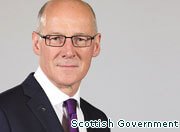Scotland’s Deputy First Minister John Swinney has warned local authorities that state guardians can only offer optional advice, after last week’s Supreme Court judgment on the Named Person scheme.
A statement released at the weekend urges local authorities and health boards to “take care to reiterate the voluntary nature of any advice, information, support or help offered by the ‘named person'”.
The tone is in marked contrast to Swinney’s attempt to portray the ruling as a Government victory.
Unlawful
The Government suffered an embarrassing defeat last Thursday when the UK Supreme Court ruled the central provisions in the Named Person legislation to be unlawful.
The new statement is the first indication that the Scottish Government is heeding the Supreme Court’s direction.
Its caution follows the Supreme Court’s recognition of the risk that parents could be given the impression they must accept the advice offered and that failure to co-operate would reflect badly on them.
Compulsion
The ruling stated: “An assertion of such compulsion, whether express or implied, and an assessment of non-cooperation as evidence of such a risk could well amount to an interference with the right to respect for family life”.
Supreme Court judges said that, given the vagueness of the legislation’s key concept ‘wellbeing’, it “might be difficult” to justify this under article 8 of the European Convention on Human Rights.
The Government’s statement further urges public authorities to “assure themselves that policy and practice continues to be in line with relevant legislation”.
Human rights intrusion
There are concerns that councils may already have unlawfully shared sensitive information about children under pilot versions of the Named Person scheme.
In their ruling last week, judges highlighted the “very broad criteria” in the Named Person legislation which could “trigger the sharing of information by a wide range of public bodies and also the initiation of intrusive enquiries into a child’s wellbeing”.
This criteria has been applied in several pilot schemes, and parents have already complained of intrusive data being gathered on themselves and their children.
Campaign group NO2NP has pointed out that in light of last week’s ruling, families will have the opportunity to go down the legal route and seek to secure financial compensation for “gross invasion of their human rights”.
Vindication
The Scottish Government and Deputy First Minister John Swinney in particular have been heavily criticised for portraying last week’s ruling as a victory for the Government.
Christian Institute Director Colin Hart said the successful legal action was a “vindication” of years of campaigning to protect families from state interference.
He dismissed Mr Swinney’s claims and said new Named Person legislation would be impossible to operate in the way the Scottish Government originally wanted.
To find out more about last week’s judgment and the Named Person scheme in general, visit our website.

